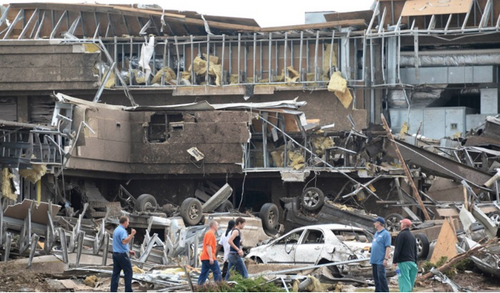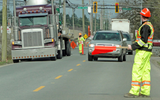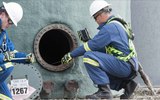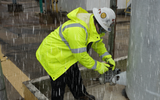CDC Provides Safety Equipment List for Tornado Clean-Up Crews
Tornadoes like the ones that ripped through Oklahoma this week leave clean-up crews with thousands of tons of building materials strewn across the landscape and the potential for respiratory and other health problems later on if they are not careful.
The Center for Disease Control and Prevention (CDC) is warning rescue and clean-up crews to stay away from buildings or structures until they have been examined and certified as safe to enter. They are offering a CDC resource guide which helps responders minimize risks when working in the disaster site.
The CDC resources cover everything from lung protection to electrical hazards. Clean-up crews and homeowners working with fiberglass insulation, for instance, need to be on their guard. Not only is it a skin and eye irritant, but airborne particles can get into the lungs if appropriate respirators are not used.
With so much damage after large-scale tragedies like this, responders often dive in to help without regard to the long-term consequences of the materials they are handling. While newer houses damaged or destroyed in the tornado likely have fiberglass insulation, older houses often contain asbestos. And while asbestos tiles, shingles, and other building materials are often stable when undisturbed, clean-up of asbestos is a very serious matter.
The tremendous force of a tornado also creates more commonplace dangers such sharp edges and impalement hazards. Strong, puncture-resistant gloves keep fingers and wrists protected and are recommended for clean-up workers.
Eye protection is another area of concern for first responders and clean-up crews. Airborne mold can create serious health problems. Eyes should be protected, especially after mold blooms have had time to expand as clean-up continues, so that no spores find their way to the mucus membrane and cause long-term issues. Goggles and cross-over safety glasses create a sealed barrier against mold spores as well as other harmful or just plain irritating particulate matter than may be present in demolished or severely damaged housing and office buildings.
If you have questions about the correct safety equipment to use for disaster clean-up, even if you're not using our products, we are happy to help however we can. Please contact us online at pksafety.com or call us at 1-800-829-9580 Monday through Friday from 7am to 5pm PST.
Photo credit: Gene Blevins/Reuters photo
Recent Posts
-
Promoting Safety: National Work Zone Awareness Week is April 15-19, 2024
Each year, the National Work Zone Awareness Week (NWZAW) places the spotlight on the importance o …Apr 11th 2024 -
Understanding 4 Gas Monitors: How They Work & Why They Are Important
In today’s increasingly dynamic industrial landscape, 4 gas monitors have emerged as critical com …Apr 8th 2024 -
April Showers Require Workers to Wear Hi-Vis Safety Rain Gear
While April showers bring May flowers, they also bring challenges, particularly for those working …Apr 1st 2024





